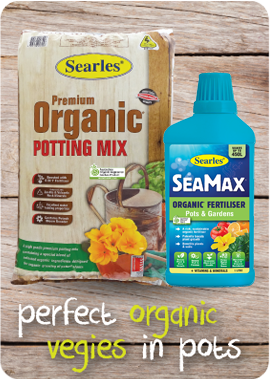ORGANIC
 |
|
Growing your own veggies at home is both rewarding and great fun. In days gone by it was believed that organic vegetables could only be grown in garden beds. However, with the modern advent of organic potting mix and organic fertilisers, we can now grow organic homegrown vegetables successfully in pots.
Basically, veggies that are not too large and cumbersome e.g. sweet corn is better suited to the garden bed. WHICH ORGANIC POTTING MIX TO USE Searles has launched a trialled and tested certified organic potting mix, called Searles Organic Potting Mix. This mix has been developed using the latest organic processes and technologies to provide a premium organic mix ideal for organic growing of all plants in pots. Never use garden soil mix or compost in pots. These products are designed specifically for use in garden beds and when used in pots, they tend to hold too much moisture and do not provide adequate aeration of the soil. This all leads to waterlogged root systems and less than ideal plant growth. Potting mix is structured to provide ideal aeration and water retention for optimum growth. PLANTING Plant seeds or seedlings according to the directions on the packet or punnet. Seeds work very well in pots as potting mixtures provide good conditions for seed germination. Because seedlings start out so small, a common mistake is to plant them too close together. As the plant matures however, they become crowded and do not perform or taste as good as they would have if they had had plenty of space. Tomatoes will do best with one strong plant per pot. Beans and peas will do equally as well with 2 to 3 plants per pot. MULCHING Mulch well to save water and keep the potting mix in good condition. Seedlings can be mulched immediately after planting. If planting seeds, wait until they have sprouted before mulching, otherwise, the mulch can prevent them from growing through the surface. FERTILISING Potted veggies can be fed the same way as veggies in garden beds. All good potting mixes will contain a starter fertiliser but for good veggie growth, you will need to apply more fertiliser through the growing period. Apply 5 IN 1 Organic Fertiliser - Vegetable & Herb to the soil after seedlings have established and hardened off. You can also apply liquid plant foods while you are watering the pots. Use organic plant foods such as SeaMax Organic Fertiliser, a mixture of both fish and seaweed fertilisers. Apply this over the plants' foliage and the soil to drench the roots. Doing this every 1–2 weeks, growing vegetables is a pleasure with the absolute minimum of pest problems. Continue to feed the plants up until maturity of fruit set, then stop fertilising through the plants final stages. PEST CONTROL This is one area where pots are of great benefit over garden beds as vegies generally growing in pots are relatively insect and pest free. Typical culprits like snails find pots less attractive and are easier to spot. If you do notice insect activity, use a soft organic spray such as Searles Bug Beater (pyrethrum spray) or flick them off the plant and squash them. When growing tomatoes, attach fruit fly traps to the tomato stakes above the pots. This trap kills the male fruit fly and stops the breeding cycle. Recycle and reuse! After a crop of veggies in pots has finished, you can re-use the potting mix for another crop. It is good practice to grow a different type of vegetable to avoid any potential build-up of plant disease. Simply re-invigorate the potting mix with 5 IN 1 Organic Fertiliser - Vegetable & Herb and start again. You will find that 'vegies in pot' growing is very successful if you make sure you use large pots and adequately water and feed. The plants are very easy to maintain and the results are great tasting, superb organic homegrown produce! Bon appetite! |
 --------------------------------- FOR MORE INFO CLICK PRODUCT NAME BELOW Searles Organic Potting Mix SeaMax Organic Fertiliser |




